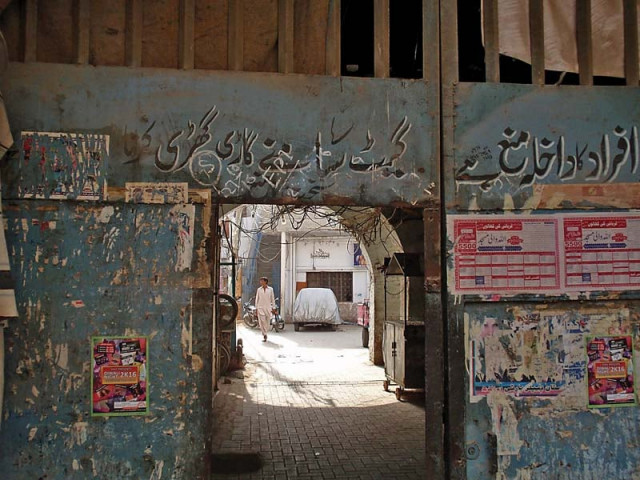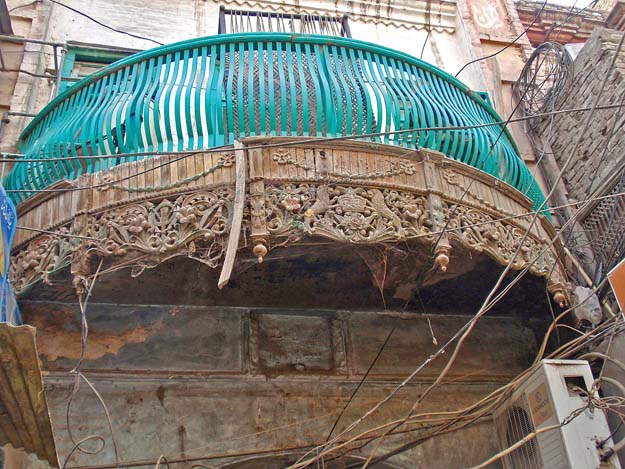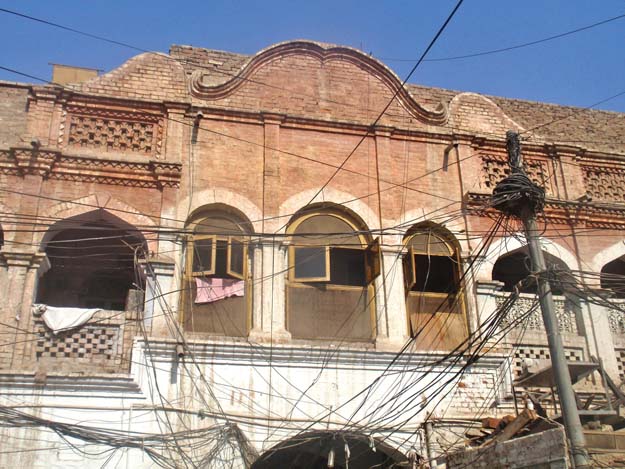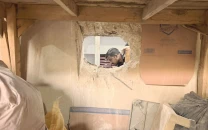90 years later, Hindu Dharamshala a shadow of its former glory
The former Hindu hotel has seen turbulent times and is now a residential complex

The Hindu Dharamshala in Sukkur, which was constructed in 1925, was once a hotel and community centre. PHOTOS: EXPRESS

There was a hotel inside the Dharamshala, where food and tea was available at subsidised rates for visitors. In its courtyard, there was a two-foot high platform with iron benches installed along the side. This platform was used as an open community hall, where different functions used to take place.
Situated near the clock tower, the Dharamshala, which earlier used to serve as a boarding and lodging facility for visitors, has been turned into a residential complex, where many Hindu families are living. Prakash, one of the residents of the Dharamshala, told The Express Tribune that his family shifted to the complex in the mid 1950s and has been living here ever since.
The hotel at the Dharamshala was established by three partners - Bhago Mal, Cheno Mal and Moti Ram. Prakash said that with the passage of time, the Hindu hotel was renamed Qalandari Hotel and one of its branches was established outside the Dharamshala for the general public.

Prakash said that the Dharamshala served as a boarding house till 1947. After partition, when violence began to spread, some of Hindu families took shelter in the Dharamshala and never left, thereby turning the hotel into a residential complex. Many people residing in the Dharamshala have made many changes to its structure to accommodate their growing families, he said. "And in this way, the Dharamshala lost its original historic shape," he added.
The Evacuee Trust Property department gets rent for every residential unit but never thinks about the structure's maintenance or repair, said Prakash. "The residents have to carry out repair and maintenance on their own," he said. Everything in the Dharamshala has changed, from the temple and platform to the well. The hotel in the Dharamshala has now been shifted outside the building and is operating under the the name 'Qalandari Hotel'. The owners of the Qalandari Hotel had also established a branch near Cantt Railway Station, which is still there, said Prakash.
An elderly resident of the Dharamshala, Mandho Girr, who was born in 1937, remembers the days when the Dharamshala used to be a boarding facility. "My father, Khem Chand, was a cook at the hotel in Dharamshala and as a kid, I often accompanied him to the Dharamshala," he recalled. According to him, the rooms of the Dharamshala were not furnished and therefore visitors had to rent a charpoy and sheet or quilt, depending on the weather.
Girr said at that time there used to be a Muslim rest house adjacent to the Dharamshala but it was demolished in the mid-1960s and the municipal corporation constructed a commercial and residential complex named the Mehran Markaz in its place, he added.

Everything was fine till the mid-1950s until differences arose with the Hindu Panchayat, after which the Evacuee Trust Property department took over the custody of the Dharamshala after declaring it 'enemy property', he recalled. Since then, all the residents of the Dharamshala are paying between Rs1,500 and Rs2,500 in rent to the Evacuee Trust Property every month, Girr said. "As a child I have seen the glory of the Dharamshala, which now ceases to exist" he lamented. Encroachers and shops constructed along its boundary wall added to the dilapidation of the structure.
Published in The Express Tribune, November 15th, 2016.



















COMMENTS
Comments are moderated and generally will be posted if they are on-topic and not abusive.
For more information, please see our Comments FAQ